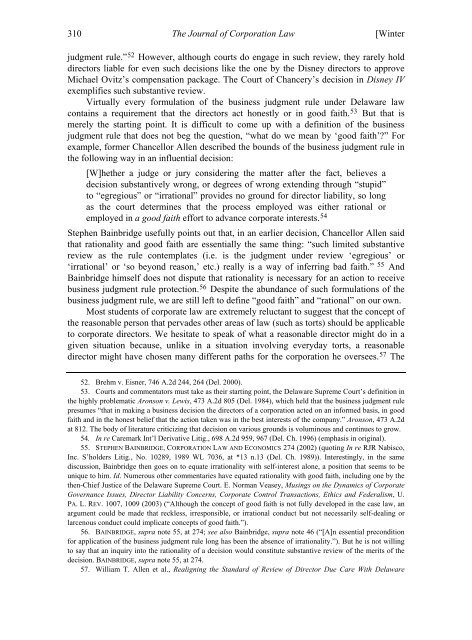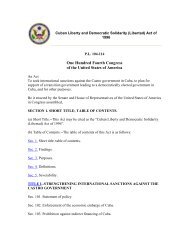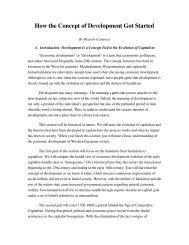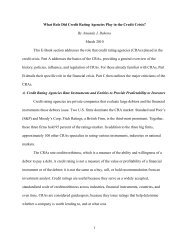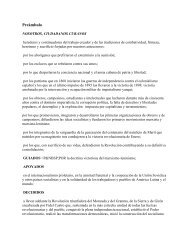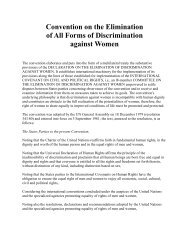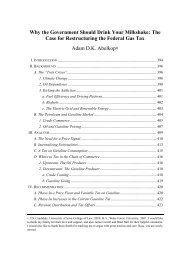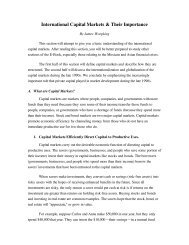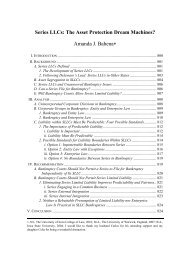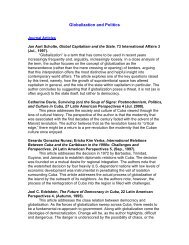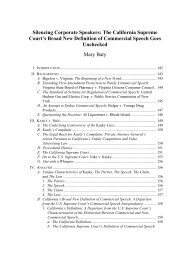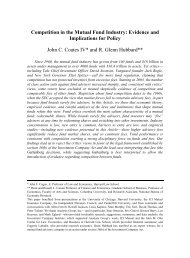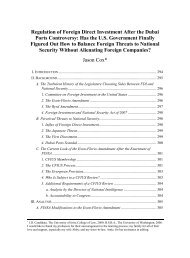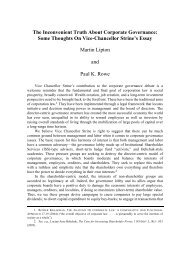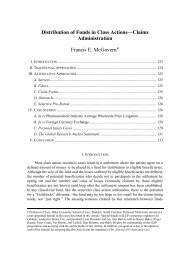Galactic Stupidity and the Business Judgment Rule - College of Law
Galactic Stupidity and the Business Judgment Rule - College of Law
Galactic Stupidity and the Business Judgment Rule - College of Law
You also want an ePaper? Increase the reach of your titles
YUMPU automatically turns print PDFs into web optimized ePapers that Google loves.
310 The Journal <strong>of</strong> Corporation <strong>Law</strong> [Winter<br />
judgment rule.” 52 However, although courts do engage in such review, <strong>the</strong>y rarely hold<br />
directors liable for even such decisions like <strong>the</strong> one by <strong>the</strong> Disney directors to approve<br />
Michael Ovitz’s compensation package. The Court <strong>of</strong> Chancery’s decision in Disney IV<br />
exemplifies such substantive review.<br />
Virtually every formulation <strong>of</strong> <strong>the</strong> business judgment rule under Delaware law<br />
contains a requirement that <strong>the</strong> directors act honestly or in good faith. 53 But that is<br />
merely <strong>the</strong> starting point. It is difficult to come up with a definition <strong>of</strong> <strong>the</strong> business<br />
judgment rule that does not beg <strong>the</strong> question, “what do we mean by ‘good faith’?” For<br />
example, former Chancellor Allen described <strong>the</strong> bounds <strong>of</strong> <strong>the</strong> business judgment rule in<br />
<strong>the</strong> following way in an influential decision:<br />
[W]he<strong>the</strong>r a judge or jury considering <strong>the</strong> matter after <strong>the</strong> fact, believes a<br />
decision substantively wrong, or degrees <strong>of</strong> wrong extending through “stupid”<br />
to “egregious” or “irrational” provides no ground for director liability, so long<br />
as <strong>the</strong> court determines that <strong>the</strong> process employed was ei<strong>the</strong>r rational or<br />
employed in a good faith effort to advance corporate interests. 54<br />
Stephen Bainbridge usefully points out that, in an earlier decision, Chancellor Allen said<br />
that rationality <strong>and</strong> good faith are essentially <strong>the</strong> same thing: “such limited substantive<br />
review as <strong>the</strong> rule contemplates (i.e. is <strong>the</strong> judgment under review ‘egregious’ or<br />
‘irrational’ or ‘so beyond reason,’ etc.) really is a way <strong>of</strong> inferring bad faith.” 55 And<br />
Bainbridge himself does not dispute that rationality is necessary for an action to receive<br />
business judgment rule protection. 56 Despite <strong>the</strong> abundance <strong>of</strong> such formulations <strong>of</strong> <strong>the</strong><br />
business judgment rule, we are still left to define “good faith” <strong>and</strong> “rational” on our own.<br />
Most students <strong>of</strong> corporate law are extremely reluctant to suggest that <strong>the</strong> concept <strong>of</strong><br />
<strong>the</strong> reasonable person that pervades o<strong>the</strong>r areas <strong>of</strong> law (such as torts) should be applicable<br />
to corporate directors. We hesitate to speak <strong>of</strong> what a reasonable director might do in a<br />
given situation because, unlike in a situation involving everyday torts, a reasonable<br />
director might have chosen many different paths for <strong>the</strong> corporation he oversees. 57 The<br />
52. Brehm v. Eisner, 746 A.2d 244, 264 (Del. 2000).<br />
53. Courts <strong>and</strong> commentators must take as <strong>the</strong>ir starting point, <strong>the</strong> Delaware Supreme Court’s definition in<br />
<strong>the</strong> highly problematic Aronson v. Lewis, 473 A.2d 805 (Del. 1984), which held that <strong>the</strong> business judgment rule<br />
presumes “that in making a business decision <strong>the</strong> directors <strong>of</strong> a corporation acted on an informed basis, in good<br />
faith <strong>and</strong> in <strong>the</strong> honest belief that <strong>the</strong> action taken was in <strong>the</strong> best interests <strong>of</strong> <strong>the</strong> company.” Aronson, 473 A.2d<br />
at 812. The body <strong>of</strong> literature criticizing that decision on various grounds is voluminous <strong>and</strong> continues to grow.<br />
54. In re Caremark Int’l Derivative Litig., 698 A.2d 959, 967 (Del. Ch. 1996) (emphasis in original).<br />
55. STEPHEN BAINBRIDGE, CORPORATION LAW AND ECONOMICS 274 (2002) (quoting In re RJR Nabisco,<br />
Inc. S’holders Litig., No. 10289, 1989 WL 7036, at *13 n.13 (Del. Ch. 1989)). Interestingly, in <strong>the</strong> same<br />
discussion, Bainbridge <strong>the</strong>n goes on to equate irrationality with self-interest alone, a position that seems to be<br />
unique to him. Id. Numerous o<strong>the</strong>r commentaries have equated rationality with good faith, including one by <strong>the</strong><br />
<strong>the</strong>n-Chief Justice <strong>of</strong> <strong>the</strong> Delaware Supreme Court. E. Norman Veasey, Musings on <strong>the</strong> Dynamics <strong>of</strong> Corporate<br />
Governance Issues, Director Liability Concerns, Corporate Control Transactions, Ethics <strong>and</strong> Federalism, U.<br />
PA. L. REV. 1007, 1009 (2003) (“Although <strong>the</strong> concept <strong>of</strong> good faith is not fully developed in <strong>the</strong> case law, an<br />
argument could be made that reckless, irresponsible, or irrational conduct but not necessarily self-dealing or<br />
larcenous conduct could implicate concepts <strong>of</strong> good faith.”).<br />
56. BAINBRIDGE, supra note 55, at 274; see also Bainbridge, supra note 46 (“[A]n essential precondition<br />
for application <strong>of</strong> <strong>the</strong> business judgment rule long has been <strong>the</strong> absence <strong>of</strong> irrationality.”). But he is not willing<br />
to say that an inquiry into <strong>the</strong> rationality <strong>of</strong> a decision would constitute substantive review <strong>of</strong> <strong>the</strong> merits <strong>of</strong> <strong>the</strong><br />
decision. BAINBRIDGE, supra note 55, at 274.<br />
57. William T. Allen et al., Realigning <strong>the</strong> St<strong>and</strong>ard <strong>of</strong> Review <strong>of</strong> Director Due Care With Delaware


